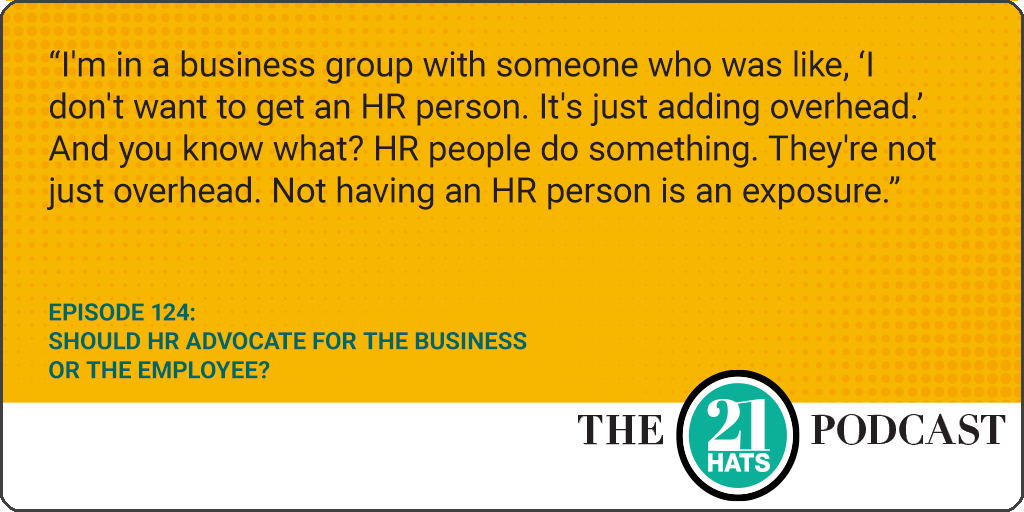Should HR Advocate for the Business or the Employee?
In our latest podcast, Jay Goltz says that’s the most important question he asks HR candidates.
Good morning!
Here are today’s highlights:
Some PPP borrowers are being denied forgiveness because of “good-faith” errors.
Opendoor, the house-flipping platform, is struggling in the current real estate market.
Why Republicans are going to war with their long-time allies at the Chamber of Commerce.
THE 21 HATS PODCAST
This week, Karen Clark Cole, Jay Goltz, and Sarah Segal talk about hiring an HR person: First, how do you handle HR issues before you can afford HR people? Is software the answer? At what size does a business need a full-time person? Do you hire someone who has experience but who might not be used to getting his or her hands dirty? Or do you hire someone you can mold to fit the culture of your business? Jay, who likes to say the entrepreneur is often the worst person to interview candidates, is currently interviewing candidates to be his head of HR, and he’s a little surprised at how few resumes he’s been getting. Plus: Sarah’s looking for office space and not finding much that would be acceptable. And how are Karen and Sarah doing now that, technically, they have been employees in their own businesses for a year?
You can subscribe to the 21 Hats Podcast wherever you get podcasts.
FINANCE
Some PPP borrowers are being denied forgiveness because of “good-faith” errors: “Hundreds of thousands of small-business owners have been denied full Paycheck Protection Program loan forgiveness because of a Small Business Administration rule — and a coalition of groups are asking the agency to rescind it. At issue is an SBA rule announced in early 2021 that declared business owners who received an excess loan amount as part of an application made in good faith would not be eligible to have the excess amount forgiven.”
“But groups such as the Center for Responsible Lending, the American Business Immigrant Coalition and others said in a recent letter sent to the SBA that the agency should reverse its decision. More than 300,000 small-business owners have been denied full forgiveness based on the rule, the groups said.”
“The rule disproportionately impacts the smallest businesses, the groups said, and stressed the chaotic rollout of the initial program in 2020 during which the SBA made a number of rule changes, often without notice, that gave business owners, lenders and experts little time to digest the long-term ramifications.
“‘This ruling fails to appreciate PPP deadlines and limited funding that made it imperative for small businesses and self-employed individuals to apply for their fair share of relief as quickly as possible, while struggling to survive a global pandemic that shuttered much of the country for weeks at a time,’ the letter said.” READ MORE
SMALLBIZ TECH
Wegmans is giving up on self-checkout: “The company did not specify the amount of losses or indicate whether they were from thefts or from customers who forgot to scan certain items, but it said in a statement that it was discontinuing the app’s use until it could make improvements ‘that will meet the needs of our customers and business.’ The app, known as SCAN, was introduced early in the pandemic to provide a contactless option for grocery shopping, the company said.”
“‘SCAN users have told us they love the app and convenience it offers,’ Wegmans said in a statement. ‘Unfortunately, the losses we are experiencing prevent us from continuing to make it available in its current state.’”
“Wegmans sent an email to frequent users of the app to offer them a $20 coupon for the inconvenience. A number of shoppers shared their disappointment about the app going out of service, saying on Twitter that it made their grocery trips more efficient.” READ MORE
HUMAN RESOURCES
In the city that never sleeps, businesses are closing a little earlier: “The reasons for the early closings vary: Some businesses grew weary of the drunken clientele in the wee hours. Some worried about the safety of their staff commuting home. Some scaled back during the pandemic and have not yet resumed round-the-clock hours. And many restaurants still report difficulty in finding enough help, even amid signs of improvement. While the rest of the country has regained all of the jobs it lost during the pandemic, New York City is bouncing back more slowly. Many hotel and restaurant jobs have disappeared because fewer people are visiting the city or dining out, and the jobs that remain are often the hardest to fill, offering late-night shifts and relatively low pay.” READ MORE
Pilot studies of the four-day work week are continuing and gaining acceptance in the U.K., U.S., New Zealand, Australia, Ireland, and Canada, but not all of the organizations that begin the trials complete them: “Roughly one in five employers drop out, more than half during the pre-planning stage. Executives who have undertaken the pilot studies say that they face the dual challenge of overcoming staff and industry five-day norms alongside the tricky task of improving work processes to get the same output in four days.”
“Once on four-day schedules, the companies that struggle are often very small and in fields that necessitate five- or seven-day shift coverage, which requires precise scheduling among small numbers of staff.”
“Organizations also abandon truncated schedule efforts when hit with unexpected changes, such as new leadership or financial changes.” READ MORE
THE ECONOMY
John Burns and I will be talking about the economy tomorrow in a free, virtual, Small Giants conversation. Here’s his take on the real estate market:


REGISTER FOR OUR CONVERSATION HERE
Opendoor, the data-driven, home-flipping company, is taking losses as the housing market falls: “The company, which sells thousands of homes in a typical month, lost money on 42 percent of its transactions in August, according to research from YipitData. Opendoor’s performance — as measured by the prices at which it bought and sold properties — was even worse in key markets such as Los Angeles, where the company lost money on 55 percent of sales, and Phoenix, where the share was 76 percent. The losses, which don’t include fees charged to customers or expenses incurred in renovating and marketing homes, have been looming since the housing market turned suddenly in recent months. Opendoor warned investors that it expected to lose as much as $175 million in adjusted earnings before interest, taxes, depreciation and amortization in the third quarter.”
“The iBuying model relies on acquiring homes, making light repairs and reselling the properties — often within a few months of the initial purchase. When home prices were skyrocketing earlier in the year, Opendoor banked easy profits.”
“By June, median home prices had begun to decline in some areas, especially the Sun Belt markets that had been frothiest in the pandemic boom days. The shift caught Opendoor by surprise, leaving it to offload thousands of properties it had agreed to purchase when prices were rising.” READ MORE
POLICY
Republicans are planning to investigate the Chamber of Commerce if they take the House: “The probes, said a GOP member of Congress and multiple Republican operatives who requested anonymity to discuss plans that have yet to be made public, will marry Republicans’ newly formed hostility to the Chamber with the party’s mission to undermine the growth of the ESG investment sector. The power of ESG — which stands for environmental, social, and governance — criteria to shape company valuations and behavior has become a major source of consternation among conservatives, who argue that companies that follow it are breaking with their fiduciary duty to maximize profits for investors.”
“The Chamber has infuriated Republicans by endorsing ESG criteria. ‘Today, for many companies, climate change and carbon emissions impact long-term value, thereby becoming a factor that retirement fund managers should take into consideration,’ wrote a Chamber vice president in a typical statement in July 2020.”
“Republicans accuse ESG advocates of using ESG criteria to punish American energy companies, only to then give an advantage to large, foreign energy companies over which the U.S. has little oversight anyways.” READ MORE
THE 21 HATS PODCAST: DASHBOARD
Could California’s Fast Food Regulations Actually Work? Signed by Governor Newsom on Labor Day, California’s new fast food law creates committees that are empowered, among other things, to set an industry-wide minimum wage. The plan sparked lots of outrage, but Gene Marks explains why he thinks it’s worth a try. He also notes that it could be coming to a state near you. Plus: Gene also makes the business case for paid parental leave while also raising some interesting questions, including this one: If you offer paid leave to new parents, is that fair to employees who don’t have children? Gene also explains why he says buying Salesforce’s new small-business CRM is like ordering a salad at McDonald’s.
You can subscribe to the 21 Hats Podcast wherever you get podcasts.
Thanks for reading, everyone. — Loren



